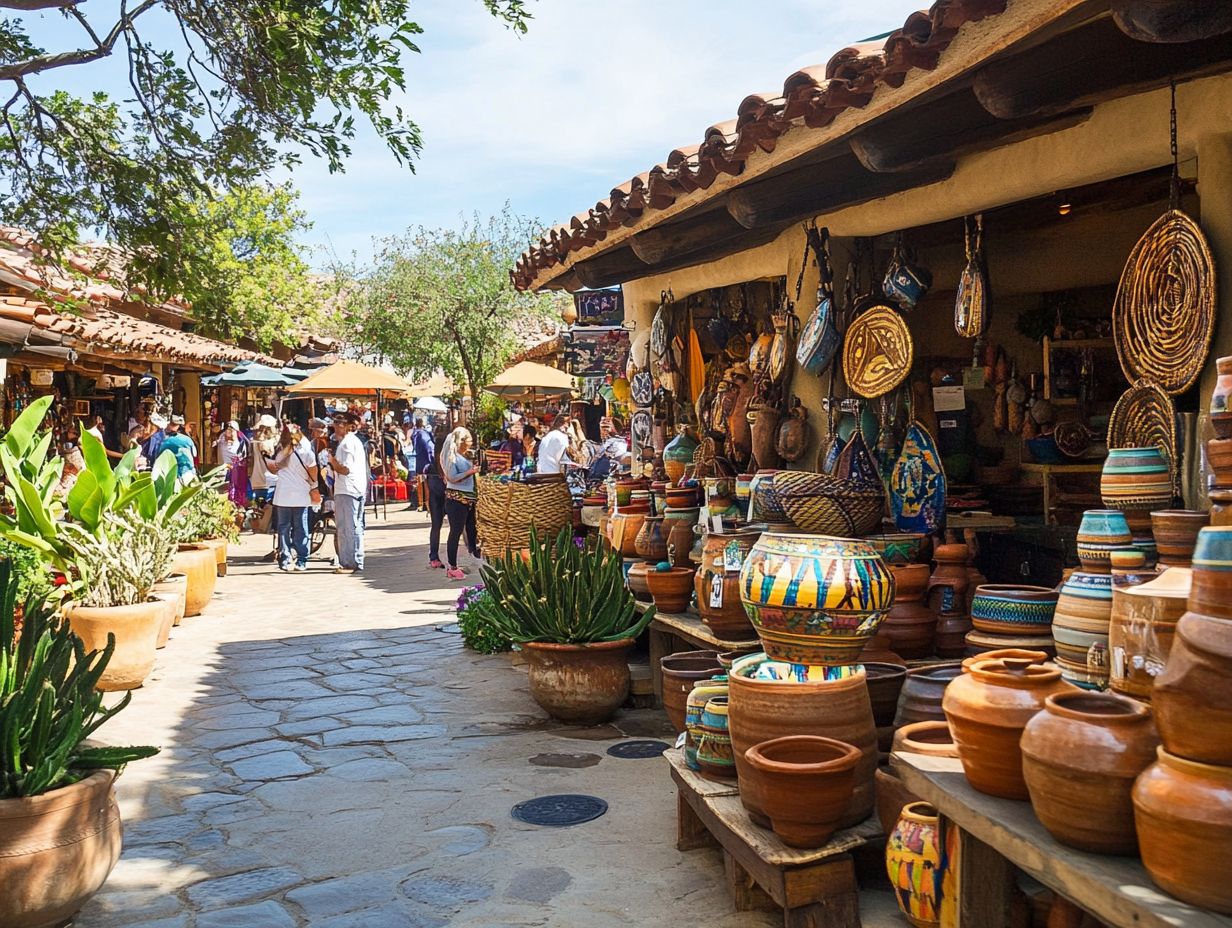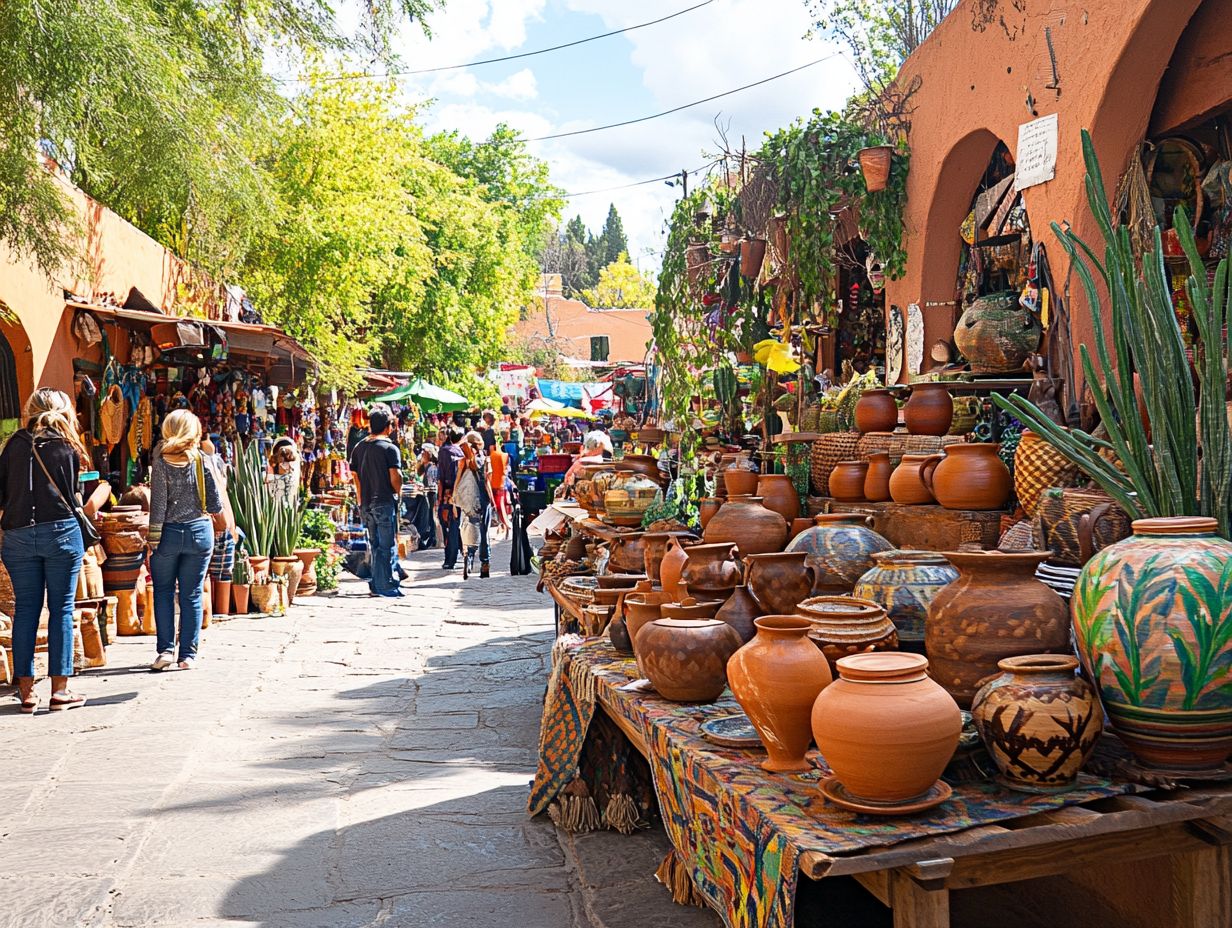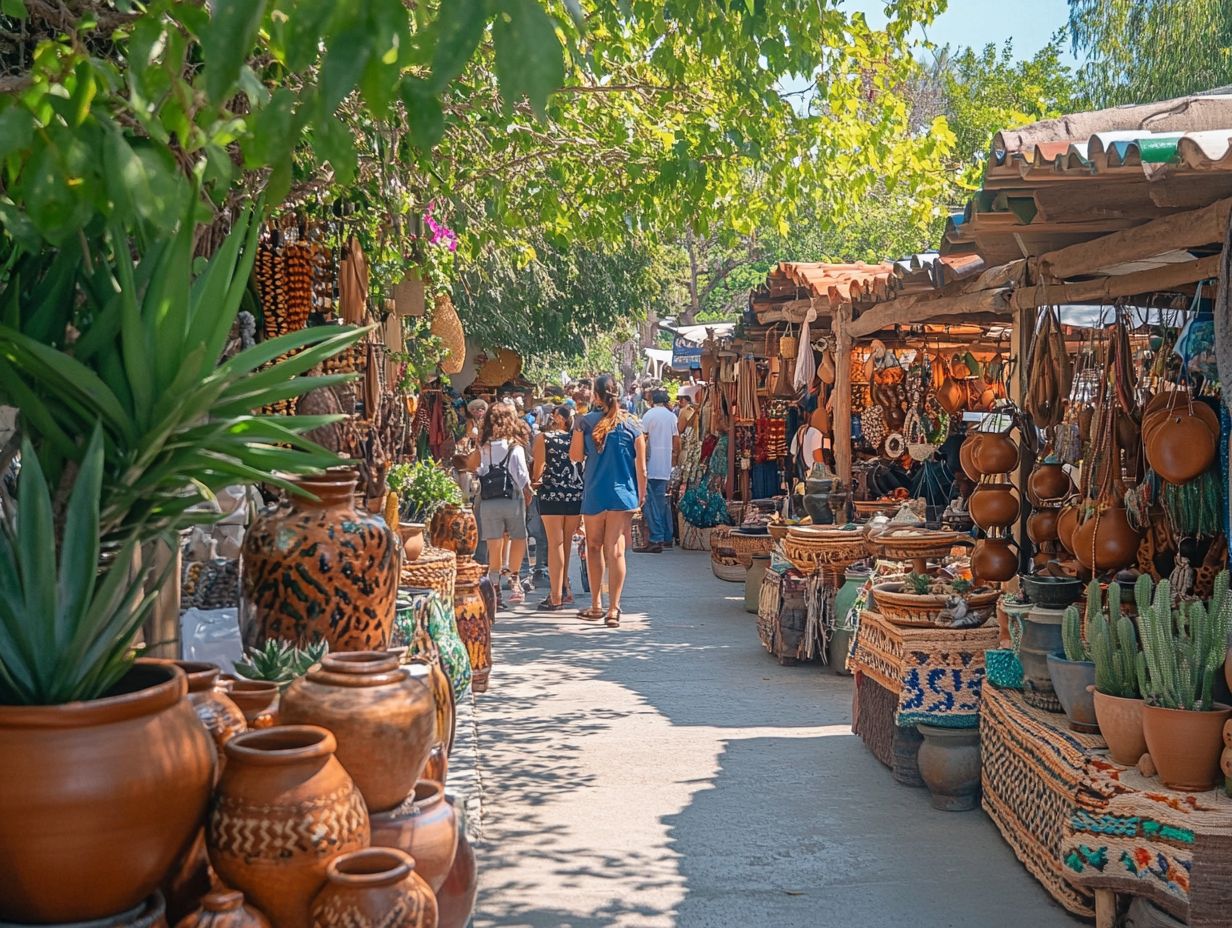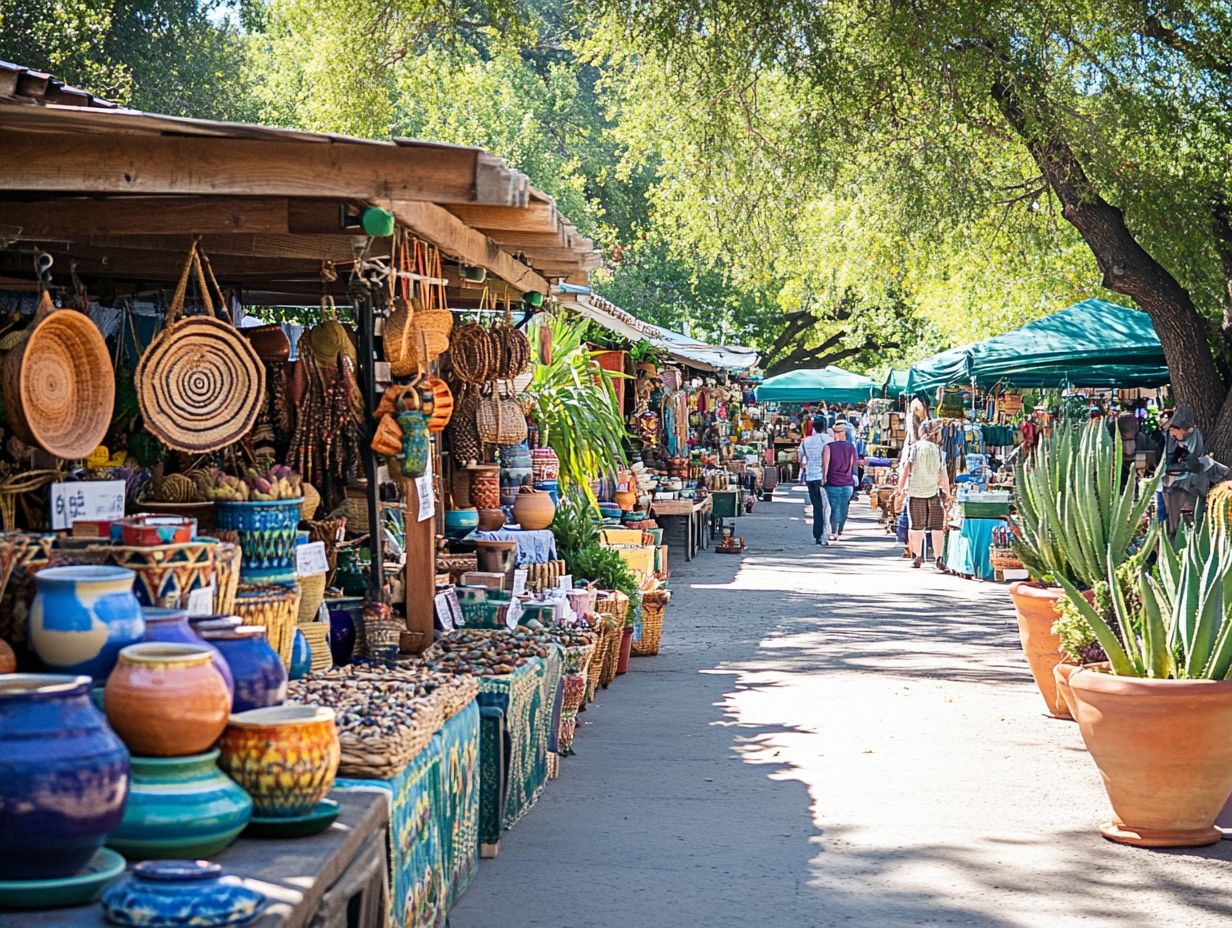Supporting Local Artisans: Eco-Friendly Shopping
Supporting local artisans is more than just buying handmade products; it means investing in a sustainable future for both communities and the environment.
This exploration dives into the many benefits of purchasing from local creators, highlighting eco-friendly practices and the positive ripple effects on your neighborhood and the planet.
You ll discover how to identify genuine artisans and uncover sustainable alternatives to mass-produced goods. Equip yourself with actionable steps to support these talented individuals and make ethical shopping choices.
Celebrate the art of local craftsmanship and recognize its crucial role in promoting a greener, more interconnected world.
Contents
- Key Takeaways:
- Why Supporting Local Artisans Matters
- Eco-Friendly Shopping: What it Means
- Ways to Support Local Artisans
- How to Identify Genuine Local Artisans
- Questions to Ask and Red Flags to Look Out For
- Eco-Friendly Alternatives to Mass-Produced Products
- Eco-Friendly Materials and Production Methods
- Making a Positive Impact Through Eco-Friendly Shopping
- Supporting Sustainable and Ethical Practices
- Frequently Asked Questions
- What does it mean to support local artisans while also shopping eco-friendly?
- How does supporting local artisans benefit the environment?
- What types of products can I find when supporting local artisans?
- How does supporting local artisans contribute to the local economy?
- Are there any additional benefits to shopping eco-friendly and supporting local artisans?
- How can I find local artisans and eco-friendly products in my area?
Key Takeaways:

- Supporting local artisans benefits both the environment and the community. By choosing to shop eco-friendly, you make a positive impact.
- Support local artisans by shopping at local markets and fairs or using online platforms dedicated to artisanal products.
- To find genuine local artisans, ask questions and watch for warning signs to ensure your purchases support sustainable and ethical practices.
Why Supporting Local Artisans Matters
Supporting local artisans is crucial for nurturing cultural richness and elevating the global fashion landscape. By prioritizing sustainable practices and community development, you play a pivotal role in economic empowerment while offering a platform for unique craftsmanship that highlights traditional skills and artisan techniques.
This movement goes beyond mere preservation of cultural heritage; it champions ethical fashion, ensuring artisans are fairly compensated for their artistry. In doing so, you contribute to strengthening local economies and support the global call for ethical values in the fashion industry.
Benefits to the Environment and Community
Supporting local artisans profoundly benefits both the environment and your community by promoting sustainable practices that significantly reduce the fashion industry’s carbon footprint.
When you encourage responsible sourcing of materials, these artisans ensure their production processes minimize waste and promote eco-friendly alternatives. For instance, opting for organic cotton or recycled fabrics not only cuts down on supply chain disruptions but also protects ecosystems from harmful pesticides and chemicals.
By embracing these sustainable methods, you help create jobs within local economies, bolstering economic empowerment through fair wages and nurturing an entrepreneurial spirit. As artisans flourish, communities undergo revitalization, marked by increased investment in local infrastructure and a strengthened sense of unity.
This comprehensive approach ultimately fosters healthier environments and more vibrant local economies, illustrating the impressive impact of sustainable practices on both fronts.
Eco-Friendly Shopping: What it Means
Eco-friendly shopping involves making deliberate consumer choices that emphasize ethical values, sustainable materials, and minimal environmental impact. It s about supporting local artisans and their handcrafted goods, ensuring your purchases contribute positively to both the community and the planet.
By choosing to shop locally, you not only support artisans but also contribute to a healthier planet and stronger community. Start your journey toward ethical shopping today!
Defining Sustainable and Ethical Practices
Sustainable and ethical practices in the fashion industry involve using environmentally friendly materials and ensuring fair wages. These practices also follow standards that guarantee fair working conditions, benefiting both people and the planet.
These values encourage you to explore responsible options like organic cotton or recycled fabrics. Such choices can significantly reduce environmental impact.
When you choose to manufacture items that reflect your commitment to ethical fashion, you help strengthen the local economy. This approach deepens your connection to the stories behind each ethically produced piece.
As more people learn about these practices, you’ll feel inspired to make conscious choices that support a sustainable future.
Ways to Support Local Artisans

Supporting local artisans can take many forms. You can explore local markets and fairs or use online platforms that highlight artisan-made goods.
By engaging with these offerings, you help empower communities. Your support drives economic growth and makes a meaningful impact on the lives of creators.
Shopping at Local Markets and Fairs
Shopping at local markets and fairs lets you engage with handcrafted items. You ll celebrate unique craftsmanship and cultural expressions that reflect community heritage.
These vibrant venues are not just places to shop; they are hubs of creative energy. As you explore, you’ll discover stunning handmade items, from woven textiles to beautiful pottery each piece tells its own story.
While browsing through colorful stalls, you’re more than a shopper; you’re contributing to the local economy. Your support fosters growth that sustains artistic trades and strengthens community bonds.
Online Platforms for Artisanal Products
Digital platforms have changed how artisan-made goods are sold. They provide local artisans with better access to markets and ensure fair compensation for their exceptional work.
These innovative websites and social media channels create a lively marketplace. Customers can easily find unique pieces that showcase both cultural heritage and individual creativity.
For example, sites like Etsy and Artfire not only facilitate transactions but also support ethical fashion. They encourage buyers to connect directly with makers, fostering a sustainable ecosystem that celebrates creativity and craftsmanship.
How to Identify Genuine Local Artisans
To find genuine local artisans, look for those who showcase traditional techniques and use high-quality materials. Their commitment to social responsibility reflects the integrity and craftsmanship that set them apart.
Questions to Ask and Red Flags to Look Out For
When evaluating potential local artisans, it’s essential to ask the right questions and be alert for any red flags that suggest a disregard for traditional skills or ethical values.
To ensure an authentic experience, inquire about the materials used in their crafts and the processes that bring their creations to life. Asking about the artisan s background, training, and the story behind their work can reveal whether they embody the dedication and passion that characterize traditional craftsmanship.
Be mindful of signs such as excessively low prices, rushed production timelines, or vague responses regarding sourcing. These can raise concerns about ethical practices. By supporting artisans dedicated to their craft, you enrich local economies, preserve cultural heritage, and promote responsible consumer choices.
Eco-Friendly Alternatives to Mass-Produced Products

Choosing eco-friendly alternatives to mass-produced products is crucial for promoting sustainable fashion, which focuses on environmentally friendly practices. By emphasizing sustainable materials and artisan-made goods, you embrace the principles of slow fashion.
Each thoughtful choice supports the environment and elevates your wardrobe with unique, crafted pieces that tell a story.
Eco-Friendly Materials and Production Methods
Utilizing eco-friendly materials and sustainable production methods is essential to reducing your environmental impact while supporting artisans who prioritize responsible sourcing and quality craftsmanship.
Embrace natural fibers, recycled metals, and biodegradable substances. This contributes to waste reduction and highlights the importance of traditional craftsmanship. Sourcing materials locally minimizes carbon footprints and strengthens community bonds, enabling artisans to preserve their cultural heritage. Supporting local artisans while traveling can enhance your experience; for more insights, check out the benefits of supporting local artisans.
With each stitch or carve, artisans weave together stories of sustainability, emphasizing the importance of preserving techniques handed down through generations. These responsible practices ensure that future generations can appreciate the artistry and integrity of hand-crafted goods, making a powerful statement about conscious consumerism.
Making a Positive Impact Through Eco-Friendly Shopping
Making a positive impact through eco-friendly shopping means embracing conscious consumer choices. These choices not only support sustainable practices but also strengthen community ties with local artisans.
Supporting Sustainable and Ethical Practices
Supporting sustainable and ethical practices in the fashion industry requires awareness of the financial challenges artisans face and a commitment to advocating for fair wages and social responsibility.
By taking a more informed approach to your purchasing decisions, you influence brands to prioritize sustainable practices that protect the environment while uplifting marginalized communities. Demand transparency about production methods and actively seek companies dedicated to ethical standards to create a ripple effect throughout the industry.
This conscientious consumer behavior champions fair wages for workers and fosters a broader societal shift towards valuing sustainability over the fleeting allure of fast fashion.
As you make thoughtful choices and support ethical brands, you contribute to a more just and sustainable future for everyone.
Frequently Asked Questions
What does it mean to support local artisans while also shopping eco-friendly?

Supporting local artisans while shopping eco-friendly means choosing to purchase goods or services from small, local businesses that prioritize sustainable and environmentally-friendly practices.
Start supporting local artisans today and make a difference!
How does supporting local artisans benefit the environment?
Supporting local artisans reduces the carbon footprint. You cut down on the emissions from transporting goods. Many artisans also use sustainable materials, helping to protect the environment.
What types of products can I find when supporting local artisans?
You ll discover a variety of items like handmade clothing, jewelry, home goods, and delicious food. These unique products are often not available in large chain stores.
How does supporting local artisans contribute to the local economy?
Your purchases directly support small businesses in your community. This creates jobs and keeps money circulating locally, benefiting everyone.
Are there any additional benefits to shopping eco-friendly and supporting local artisans?
Yes, when you support local artisans, you promote ethical practices. Many artisans are open about where they source their materials and how they make their products.
How can I find local artisans and eco-friendly products in my area?
Finding local artisans is easy! Search online for local markets, attend craft fairs, or ask for recommendations in your community. Social media is also a great way to connect with artisans nearby.






